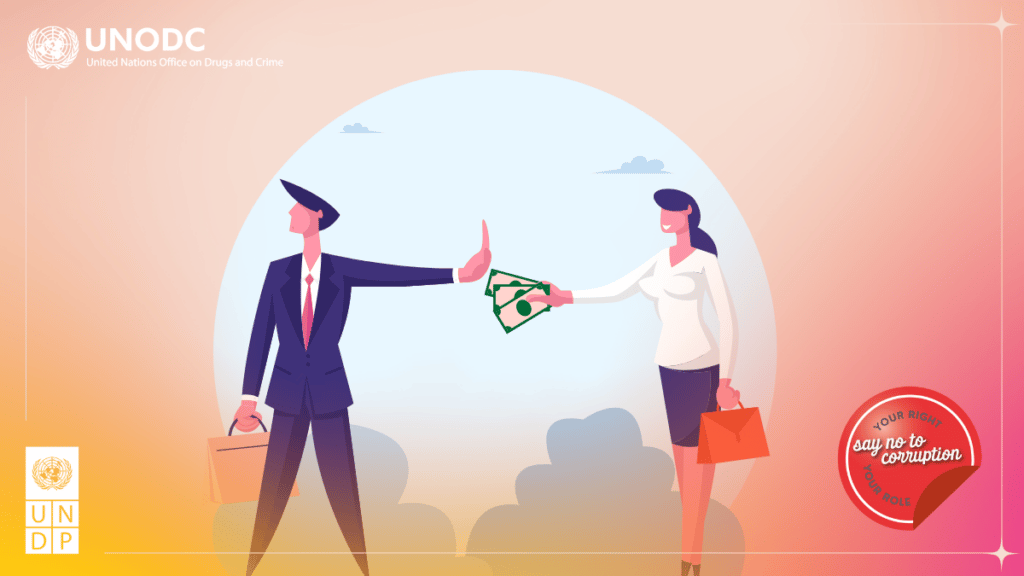December 9 marks the United Nations’ (UN) annual International Anti-Corruption Day. This year’s focus is on each individual’s “rights and responsibilities” to tackle corruption.
The day was enacted when the General Assembly adopted the UN Convention against Corruption on October 31, 2003. International Anti-Corruption Day aims to raise awareness about corruption and highlight the Convention’s work in combating corruption. At the “forefront” of recognizing the day and handling the education campaigns are the UN Development Programme (UNDP) and the UN Office on Drugs and Crime (UNODC).
International Anti-Corruption Day 2021
Each year’s commemoration of the day and education campaign has a different theme: 2020’s theme was “Recover with Integrity” and focused on corruption that occurred in relation to the COVID-19 pandemic. The theme for International Anti-Corruption Day 2021 is “Your right, your role: Say no to Corruption” and aims to raise awareness about the role everyone can play in combating corruption, “including States, Government officials, civil servants, law enforcement officers, media representatives, the private sector, civil society, academia, the public and youth.”
“Every single person – young and old – has a role to play to prevent and counter corruption, in order to promote resilience and integrity at all levels of society,” the website states. “To achieve this, policies, systems and measures need to be in place for people to be able to speak up and say no to corruption.” Thus, the UN Convention against Corruption “emphasizes the responsibility of Governments to put in place effective whistle-blower protection to ensure that persons who speak up are protected from retaliation.” The website affirms that “[t]hese measures contribute to effective, accountable and transparent institutions towards a culture of integrity and fairness.”
“To protect your rights, you need to be aware of the role you play and responsibilities you have in the fight against corruption. Speak up, “say #NoToCorruption,” the campaign urges.
The UN identifies 7 “key areas” that are integral to the fight against corruption: Education and Youth, Sport and Corruption, Gender Dimensions of Corruption, Private Sector, COVID-19 and Corruption, International Cooperation, and Technology. In the Gender Dimensions of Corruption, the campaign specifically mentions whistleblower protections. “Corruption impacts men and women differently…There is evidence of the disproportionate impact of corruption on women during the public health crises, including during the COVID-19 pandemic and its effect on the provision of education and healthcare,” the webpage states. “Gender-sensitive whistle-blower reporting and protection systems and a victim-[centered] approach are of particular importance for women as the lack of protection, fear of reprisals and the level of confidentiality can negatively impact the decision to report corruption.”
Combating Corruption in the U.S.
Leaders in the U.S. have asserted that fighting corruption at home is a critical part of fighting corruption worldwide. President Biden released the “Memorandum on Establishing the Fight Against Corruption as a Core United States National Security Interest” in June. The document “mandates that government officials file recommendations on how the U.S. government can bolster its fight against corruption,” according to previous WNN reporting. A leading whistleblower attorney has pointed to nine different ways President Biden can strengthen whistleblower protections as a measure to combat corruption.
On December 6, U.S. Treasury Secretary Janet Yellen and U.S. Agency for International Development (USAID) Administrator Samantha Power wrote an Opinion piece in The Washington Post entitled “To uphold democracy, the U.S. must fight global corruption.”
In the piece, Yellen and Power write about how all forms of corruption “take resources from citizens, undermine public trust and — ultimately — threaten the progress of those who fight for democracy.” Ahead of President Biden’s Summit for Democracy, the two officials warn that corruption has enabled world leaders to erode “fundamental rights and checks and balances… Autocrats use public wealth to maintain their grip on power, while in democracies, corruption rots free societies from within. Unchecked conflicts of interest and the unequal application of the law erode our trust in common institutions.”
Yellen and Power state: “Combating corruption abroad, therefore, begins at home, and our first step must be to expose the owners of shell companies and other illicit funds.” They announce that from now on, “the U.S. government will require many U.S. and foreign companies to report their true owners to the Treasury and to update us when they change hands. We’re also working toward new reporting requirements for real estate transactions and will be enlisting other nations to address these issues.”
They also write that the U.S. needs to serve as a “model for the wider world.”
“The idea of democracy is inseparable from the idea of America, and we cannot support free government abroad if our institutions wither at home. But that is what’s happening.” They point to information about some of the highest earners and corporations in the U.S. engaging in tax evasion, leading to “more than $600 billion” that was “effectively withheld from U.S. taxpayers.” Yellen and Power write that the U.S. Treasury “needs more resources, including more auditors, to go after evasion, and provisions in the Build Back Better Act will help us do that.”
The article also talks about the investment needed to fight corruption abroad; thus, the United States “will deepen and expand support for those fighting kleptocrats and bad actors through a new anti-corruption response fund. In the Dominican Republic, Moldova and Zambia, we’ve seen politicians win landslide victories by running on anti-corruption platforms. We want to support their reforms.”
Yellen and Power also write that the U.S. “is also increasing its support to media organizations and other watchdogs who risk their lives to expose corruption. These brave activists often play the greatest role in bringing down dictatorships, because while corruption may fuel autocracies, it can also be their Achilles’ heel. In 2019, a record year for global mass protests, roughly half were driven by exposed corruption, six of which led to changes in government.”
